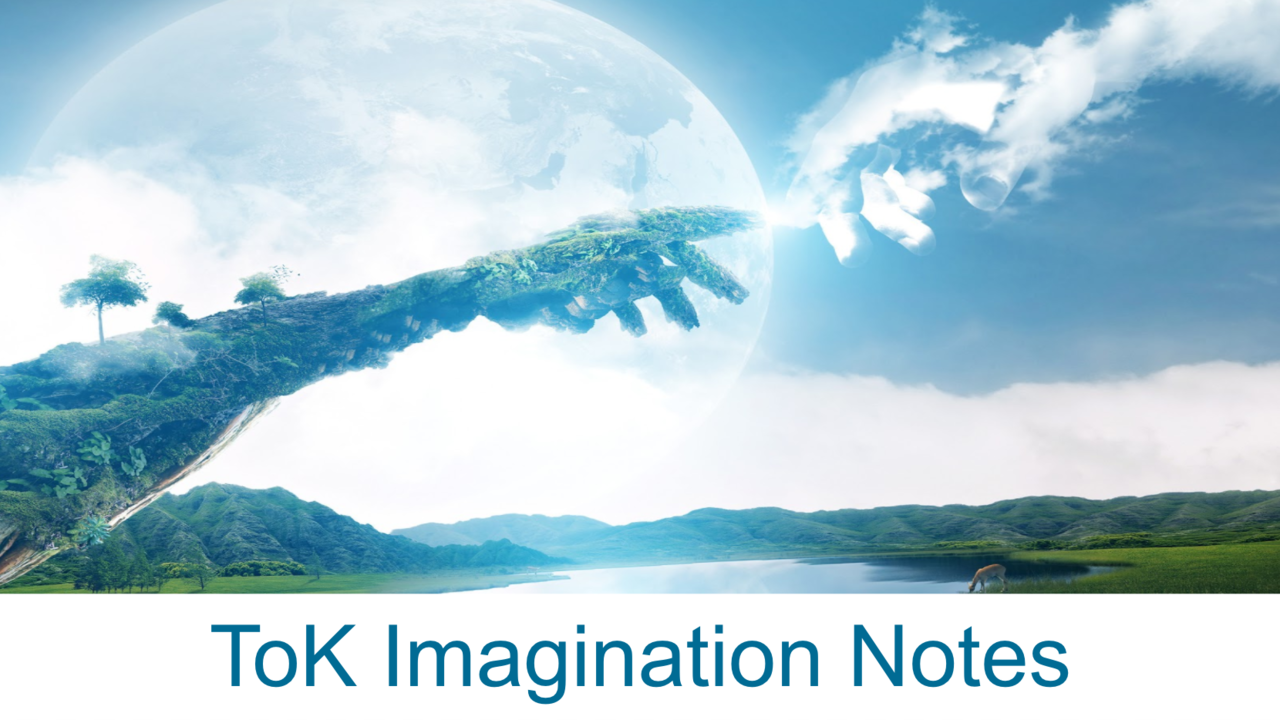Imagination Notes - Theory of Knowledge

Imagination Quotes
- "You can't depend on your eyes when your imagination is out of focus." (Mark Twain)
- "The true sign of intelligence is not knowledge but imagination." (Albert Einstein)

- "To imagine is everything, to know is nothing at all." (Anatole France)
- "No amount of skillful invention can replace the essential element of imagination." (Edward Hopper)
- "Imagination grows by exercise, and contrary to common belief, is more powerful in the mature than in the young." (W. Somerset Maugham)
- "The imagination is man’s power over nature." (Wallace Stevens)
- “Don't tell me the moon is shining; show me the glint of light on broken glass.” (Anton Chekhov)
- Reason is the natural order of truth; but imagination is the organ of meaning." (C.S. Lewis)
Imagination Definitions
- "The faculty or action of forming new ideas, or images or concepts of external objects not present to the senses." (Oxford English Dictionary).
- "Imagination is the ability to form a mental image of something that is not perceived through the five senses." (Sasson).
Little is known about how imagination actually works. Many cultures (and the billionaire-CEO of Tesla Elon Musk) have wondered whether reality itself is an illusion or a simulation.
However, scientists can use fMRI's to explore where there is activity in the brain when people imagine moving a shape around for example (see this example from Dartmouth University). But very little is understood about how these mental processes actually work.
The insights of imagination
- Imagination helps
 us solve novel problems. Einstein used thought experiments to perform experiments he couldn't do in reality. (For example, he wondered whether a clock would seem to move normally if he were observing it while traveling at light speed.) Our brains are great at imagining different scenarios, giving us knowledge of things we haven't yet experienced. As Einstein put it imagination is “...the preview for life’s coming attractions.”
us solve novel problems. Einstein used thought experiments to perform experiments he couldn't do in reality. (For example, he wondered whether a clock would seem to move normally if he were observing it while traveling at light speed.) Our brains are great at imagining different scenarios, giving us knowledge of things we haven't yet experienced. As Einstein put it imagination is “...the preview for life’s coming attractions.” - Similar to the previous point, our imagination helps us to appreciate different realities presented to us in the arts. For example, when reading a novel imagination helps us explore how we would feel or act in these situations. “Individuals who frequently read fiction seem to be better able to understand other people, empathize with them, and see the world from their perspective” (Mar and Oatley).
- Imagination helps in the processing of the day's information, making meaningful connections. This shows us during dreaming, but also during daydreaming (or mind wandering). Einstein said, "When I examine myself and my methods of thought, I come close to the conclusion that the gift of fantasy has meant more to me than my talent for absorbing positive knowledge" (Fries).
- Imagination helps artists with their creations, which facilitates the production of knowledge through art. And it helps architects design spaces which combine old realities with new insights, to help people live and think in new ways.
Weaknesses of imagination
Imagination can be limited by insufficient knowledge. Psychologist Loran Nordgren confirmed that people typically underestimate how painful it feels to be bullied or socially excluded (Nordgren). In the same study, middle school teachers were found to suggest harsher punishment for bullies if they themselves ha d experienced social exclusion in their own lives (Nordgren). These insights suggest that our ability to imagine someone else's experience and emotions are limited by our own experiences. Similarly it might be impossible to imagine four-spacial dimensions.
d experienced social exclusion in their own lives (Nordgren). These insights suggest that our ability to imagine someone else's experience and emotions are limited by our own experiences. Similarly it might be impossible to imagine four-spacial dimensions.
But having too much knowledge can also constrain imagination. For example...


Woods, Tim. “Imagination Notes - Theory of Knowledge ” IBMastery 2 April 2021. Web. <https://www.ibmastery.com/blog/imagination-notes-theory-of-knowledge>







